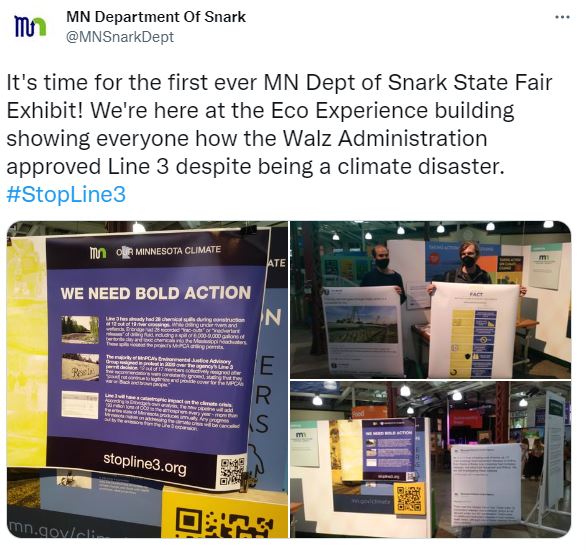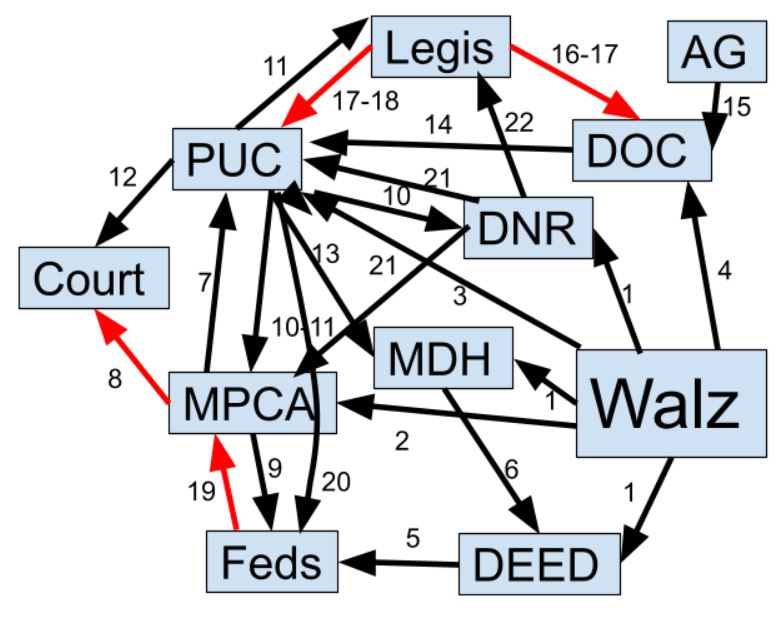Unprecedented drops in oil prices have provided even more proof that Enbridge’s Line 3 tar sands oil pipeline is unnecessary, and would be detrimental to Minnesota’s economy, environment, and public health.
Gov. Walz has taken some pragmatic leadership steps to protect Minnesota’s public health against the coronavirus. He recently stated that social distancing practices will likely disrupt business for up to 18 months. These disruptions have resulted in dramatically reduced demand for gasoline in Minnesota. Gasoline is very inelastic, meaning that even very low prices won’t induce much increased demand, especially since it’s clear that these social distancing practices are the new normal.
The pandemic caused U.S. gasoline demand to plummet by nearly 50%, according to the U.S. Energy Information Administration (EIA). Furthermore, the unmitigated Saudi-Russian production war continues to flood the market with cheap crude oil. The combined supply and demand shock resulted in very low, and sometimes negative oil prices for the first time in U.S. history. This means that extractors had to pay up to $37.63 per barrel to consumers for taking the oil off their hands. These extremely low prices cast doubt on the need for Line 3.
Oil from Western Canada’s tar sands also continued to experience very low and negative prices. Canadian oil storage capacity is even more limited than in the U.S., so massive supply cuts will be continuing across the continent. This was already occurring in the tar sands, as plans for new extraction projects have been cancelled, and existing large extraction sites as young as two years old are being considered for closure. Additionally, Canadian oil transport companies like Enbridge are also financially hurting; their stock recently dropped 44% in a 5-week span.
Enbridge wants to transport Western Canadian tar sands oil through the proposed Line 3 pipeline to midwestern refineries. However, it’s becoming increasingly clear that there will not be enough long-term tar sands oil production, nor will there be enough American gasoline demand to warrant a new pipeline being built to export oil to the U.S. Enbridge’s mainline system is currently running significantly below capacity according to S&P, and Rystad predicts that production cuts will continue to exceed Line 3’s planned capacity. Furthermore, Minnesota’s refineries have been forced to cut production by ~50%, so they have no need to import extra oil from Canada.
These are some of the main reasons why the MN Department of Commerce ruled that Enbridge did not demonstrate sufficient need for Line 3. However, the Walz administration has quietly taken steps to clear obstacles for Enbridge to move forward with the pipeline. Walz has appointed new Public Utility Commissioners who have publicly supported Line 3. Furthermore, the MN Pollution Control Agency (MPCA) decided to indefinitely halt the MN Clean Cars rulemaking process due to the coronavirus, yet only delayed the Line 3 permitting process by one week.
The MPCA draft permit states that water quality impacts from Line 3 are “necessary to accommodate important economic or social changes.” This is an insufficient and short-sighted rationale. Recent economic changes have rendered Line 3 completely unnecessary. Let’s also discuss these important “social changes.” Line 3 would cause: more greenhouse gas emissions than our entire state currently produces; significant damage to Northern Minnesota’s pristine waterways; and unhealthy particulate air pollution that compounds the inequitable impacts of the coronavirus on those with vulnerable health and respiratory conditions. The heaviest burden will fall on Indigenous communities and people of color who already bear the brunt of pollution and pandemics.
Concerningly, the MN Department of Employment and Economic Development (DEED) made a special exemption to allow oil pipeline companies to force their employees to continue working while most of Minnesota is under a stay at home order. This dangerous policy allows travelling ‘man camps’ to work along the pipeline route. These crews traditionally increase crime in local communities, but now there is increased concern about them spreading the coronavirus among themselves, and to these communities.
The Walz Administration must show pragmatic leadership by denying all permits for Line 3, and restricting dangerous construction activities during this public health crisis to protect the future of our state, our country, and the planet.


